At 23, he acquired Swee Lee. Now, this billionaire’s son is building his own music empire.
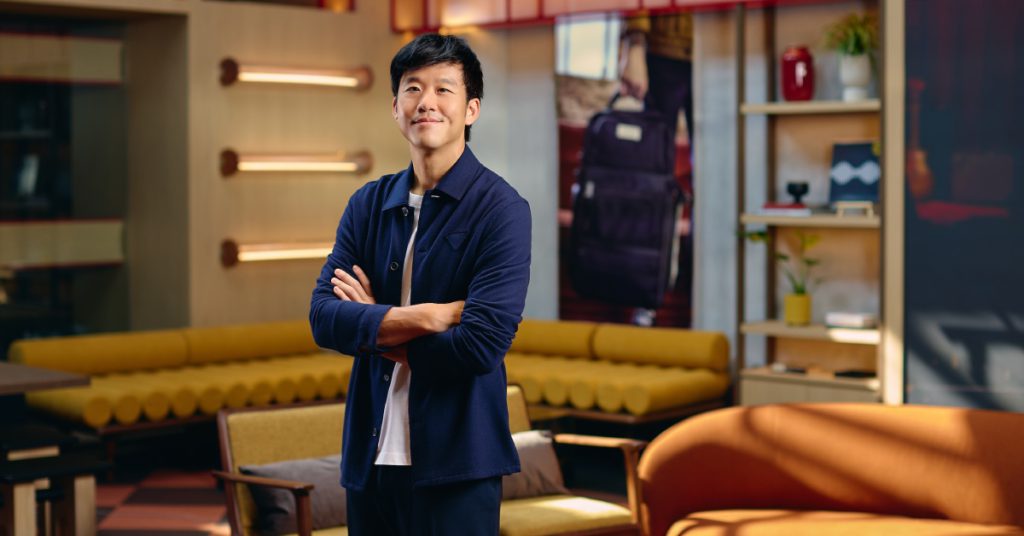
If you’ve ever strummed a guitar or picked up a pair of drumsticks, you’ve probably stepped into a Swee Lee outlet at some point.
Founded in 1946, the homegrown musical instrument distributor and retailer has long been the go-to store for musicians in the region. Whether you wanted guitars, amps, keyboards, microphones, or stands, the store had them all.
At its helm is Kuok Meng Ru, the son of palm oil billionaire Kuok Khoon Hong and grand-nephew of Malaysia’s richest man, Robert Kuok, who acquired the business when he was just 23.
This year marks 12 years since Meng Ru took the helm at Swee Lee—and in that time, he’s managed to expand the brand into Malaysia, Indonesia, Vietnam, and the Philippines, even establishing an online presence in China.
He saw a unique opportunity in the musical instrument industry
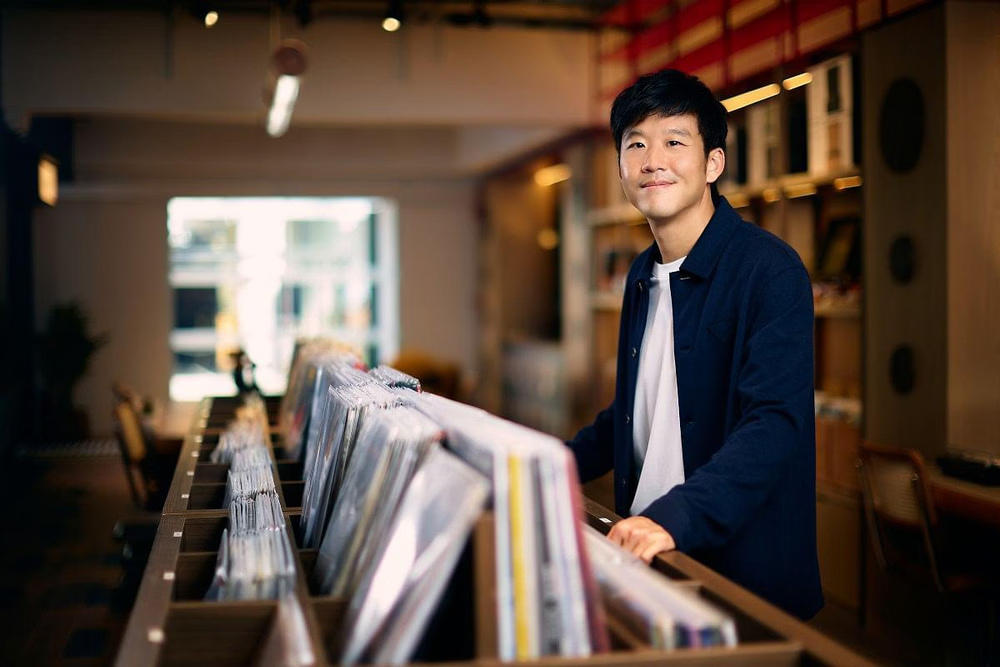
Meng Ru has always loved music since childhood, but his “real passion” kicked in when he studied abroad. He left Singapore to study in the UK when he was just 10 years old, spending his teenage years and young adulthood in the country.
I learned piano and violin as a child, but it was during my time in high school that I was introduced to bands like Radiohead and The Strokes by friends. The way my schoolmates viewed music was different too, and I began to see it not just as an interest but as something central to my life and eventually my career.
Kuok Meng Ru
Despite graduating from Cambridge University with a degree in mathematics, Meng Ru never strayed far from music. In London, he continued to play music while working as a math teacher.
“It was the best of both worlds—doing something I had spent many years studying, but also dedicating time to something I truly enjoyed,” he said in an interview with CNA back in 2022.
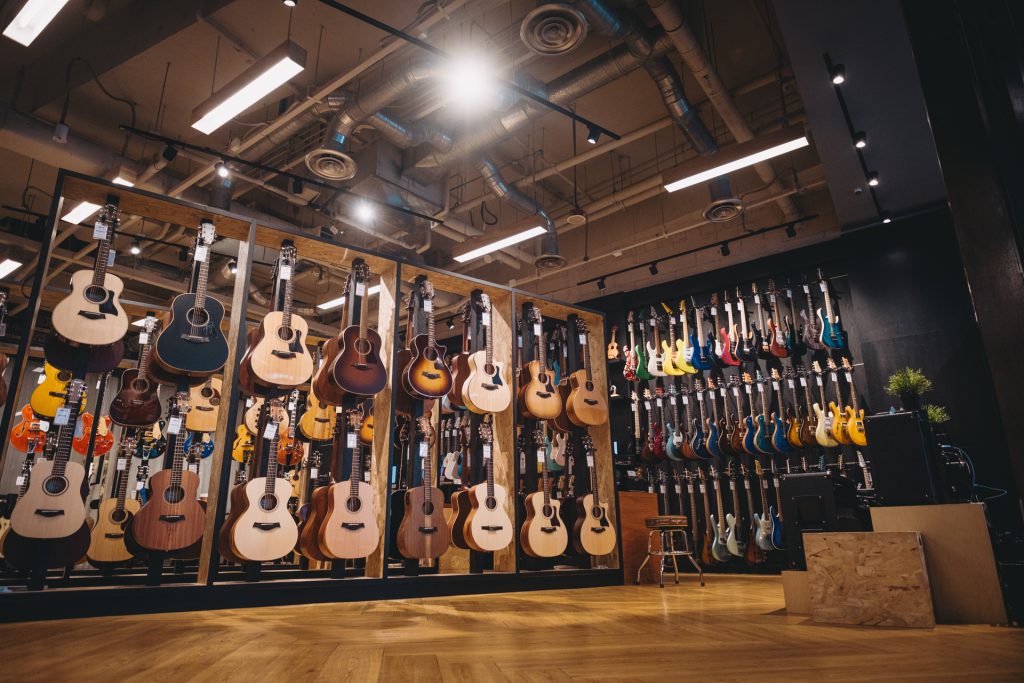
When he returned to Singapore, however, Meng Ru noticed that the local music scene at the time significantly trailed behind the UK’s.
I saw a unique opportunity in the musical instrument industry where online retail and the consumer experience weren’t as developed in Southeast Asia as they were in the UK, where many businesses were already tapping into it.
Kuok Meng Ru
Taking the reins at Swee Lee in 2012, Meng Ru believed that he could bring a “fresh perspective” to the brand and help evolve its business model.
“[Swee Lee] was a well-established, but very traditional, distributor of musical instruments,” he explained, as it primarily focused on in-store operations at the time.
With e-commerce just beginning to take shape in Singapore and Southeast Asia, Meng Ru sensed a chance to get ahead. “Given the nascency of online retail in Southeast Asia at the time, I felt that this was an area we could get a head start on over our competition,” he shared.
To modernise the brand, he focused on building “a strong direct-to-consumer online presence” and creating an “integrated omnichannel retail experience” for Swee Lee’s customers.
“This required significant investment to enhance our digital capabilities and extend our reach across Southeast Asia,” he added, though he did not disclose specific figures.
“I was lucky to have the freedom to pursue my own passions”
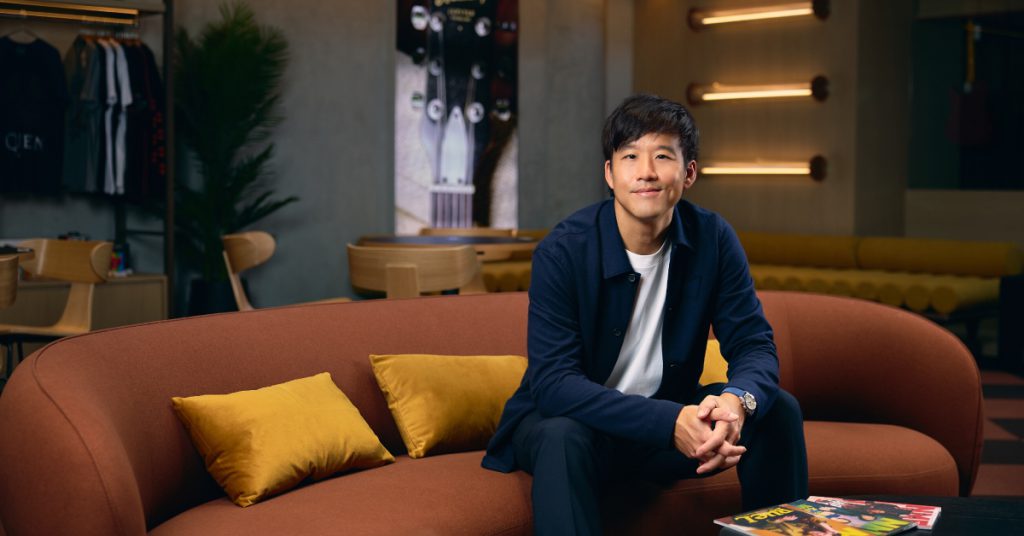
Given his family’s wealth, wouldn’t it have been easier for Meng Ru to join the family business instead of forging his own entrepreneurial path?
While he didn’t discuss his family in detail for this interview, Meng Ru acknowledged that he was fortunate to have the support to follow his passions.
I was lucky to have the freedom and encouragement to pursue my own passions, particularly with the strong advice that if you weren’t willing or interested enough to think about something 24/7, there was very little chance that you could be successful in your choice of career.
Kuok Meng Ru
Another valuable piece of advice he had received was to not only constantly assess whether you have competitive advantages but also ensure that you’re capitalising on them if you do.
“Beyond [being] able to choose my own path, having a wide network of advisors and resources from family and beyond was definitely a luxury I’ve considered myself lucky to be able to capitalise on,” he shared. “And in my opinion, it would be incredibly foolish and self-sabotaging not to do so.”
When asked if he faced any scepticism or setbacks considering his connections and young age when he acquired Swee Lee, Meng Ru responded “Regardless of background or age, any new owner of a business has a lot to prove.”
“The most important thing for me in the first few months, both internally and externally, was to focus on earning the respect of my colleagues and business partners through action, not words.”
“For us, it’s about building community”

Today, Swee Lee operates a total of 10 retail stores across Southeast Asia: two in Singapore, two in Vietnam, two in Indonesia, and four in Malaysia.
Beyond expanding its e-commerce presence, Meng Ru has also doubled down on transforming Swee Lee into a more inclusive and welcoming space. “Customers nowadays aren’t just looking for a physical instrument to buy; they’re looking for an experience,” he said.

When we reimagined Swee Lee, the goal was to make it more inclusive. If someone isn’t into guitars, there’s still something for them at Swee Lee.
They can come in and buy headphones or vinyl or just sit down and enjoy a cup of coffee with a friend. We don’t chase anyone out because, for us, it’s about building a community.
Kuok Meng Ru
The launch of Swee Lee’s new Clarke Quay store in April, according to Meng Ru, represents a “new chapter” in the brand’s consumer engagement journey—about half of the space is dedicated to community and experiential spaces, including a cafe.
The store regularly hosts events and actively supports local artists by providing a platform for them to perform and connect with their audience.
Building a music empire
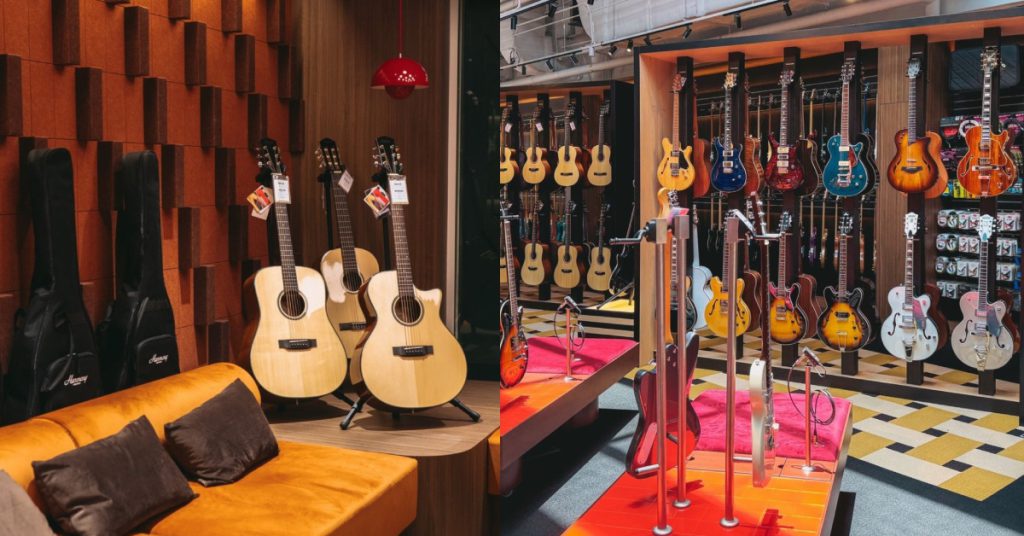
Swee Lee is a major business in its own right, but Meng Ru’s vision for the music industry extends far beyond the retail scene.
The brand is a subsidiary of Vista Musical Instruments, which is operated by Caldecott Music Group (CMG)—a company established by Meng Ru as part of an initiative to create a larger, more integrated presence in the music and lifestyle sectors.
Other companies under the CMG umbrella include the mobile-first music-making platform BandLab Technologies, which has surpassed 100 million registered users globally, and the music media group NME Networks.
Over the past 18 months, Meng Ru shared that Swee Lee has “expanded significantly” through Vista Musical Instruments and will continue exploring new markets.
“In the short term, we aim to strengthen our presence in key Southeast Asian markets while refining our Clarke Quay flagship as a model for experiential retail,” he shared.
Similarly, he plans to pursue further market entry across other divisions within Caldecott Music Group while scaling its digital platforms, such as BandLab.
But Meng Ru does not define success by these expansions alone—for him, success is about creating something that lasts.
“It’s about building brands and institutions that can thrive independently well into the future, continuing long after a specific owner, leader, or team.”
Swee Lee was around before many of us on the team were born. If we do our jobs well and are lucky enough, it’ll continue to be around long after we’re gone. To me, that would truly be the mark of success.
Kuok Meng Ru
- Learn more about Swee Lee here and Caldecott Music Group here.
- Read other articles we’ve written about Singaporean startups here.
Also Read: Why this S’porean activewear brand closed its outlets despite hitting S$1.9M annual revenues
Featured Image Credit: Caldecott Music Group
AI is putting 620,000 jobs in 10 Malaysian sectors at risk, here’s what you can do about it
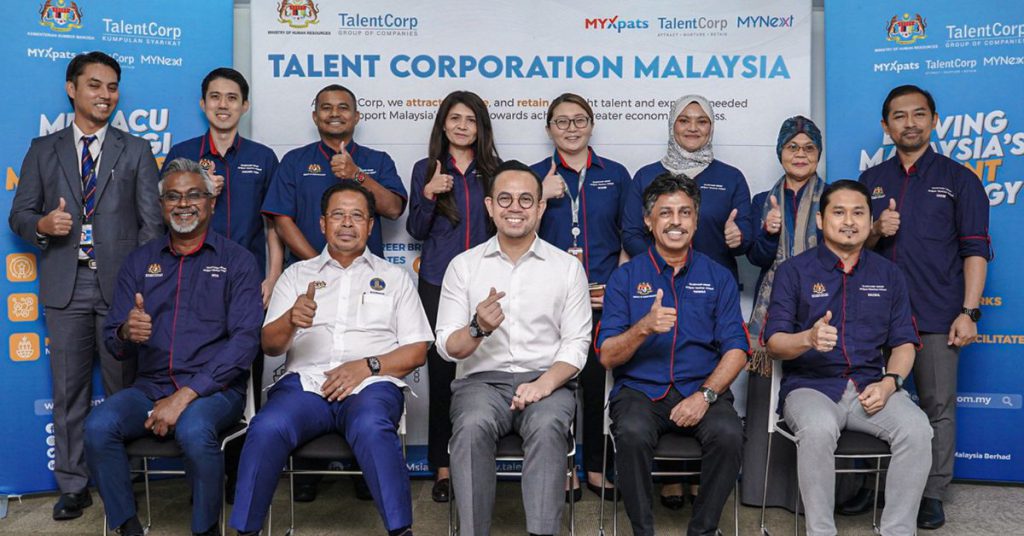
The Malaysian workforce is at a turning point. A recent study conducted by Talent Corporation Malaysia Bhd (TalentCorp) revealed that 620,000 jobs across 10 key sectors are at risk of being displaced or converged unless workers upskill or transition into adjacent roles.
With artificial intelligence (AI), digitalisation, and the green economy rapidly transforming industries, the message is clear: adapt or risk falling behind.
Here’s what this means for Malaysia’s workforce and what can be done to prepare for the future.
Which sectors are at risk?
TalentCorp’s study, conducted from April to September 2024, focused on 10 critical sectors in phase 1 that collectively contributed 60% of Malaysia’s GDP in 2023, or a whopping RM933 billion, it said in a press release.
These sectors include:
- ICT
- Global business services
- Pharmaceutical manufacturing
- Food manufacturing and services
- Electrics and electronics
- Aerospace
- Wholesale and retail trade
- Medical devices
- Chemicals
- Energy and power
Among the 3.5 million employees working in these sectors, 18% (620,000 jobs) are deemed highly impacted, while 53% (1.8 million jobs) are medium-impacted and 28% (980,000 jobs) are low-impacted.
Highly impacted means these roles are at risk of convergence or displacement, while medium impacted means the roles are still relevant, but such employees need to upskill or deliver beyond what would be traditionally expected. Low-impacted roles are those that require mostly ongoing self-improvement to stay relevant, according to the report on the study’s findings.
TalentCorp isn’t stopping here. In 2025, phase 2 of the study will expand to 12 additional sectors, including:
- Tourism
- Healthcare
- Agriculture
- Construction
- Oil & Gas
- Public Sector
The future is green and digital
The study also identified 60 emerging job roles that will gain prominence in the coming years:
- 70% in AI and digital technology
- 20% in the green economy
- 10% in other new technologies
Jobs related to AI, automation, renewable energy, and sustainability will dominate the employment landscape. For instance:
- Manufacturing may automate manual tasks.
- Finance roles could see a shift with digitalisation redefining processes.
- The green economy will revolutionise industries like energy, construction, and transportation.
The upskilling solution
Recognising these challenges, the government is stepping up to support workforce transformation. Human Resources Minister Steven Sim Chee Keong announced several initiatives, including:
1. The Ministry of Human Resources (KESUMA)’s RM3 Billion Fund
- Incentives such as levies, credits, and scholarships for critical skills.
- Matching grants for companies investing in workforce upskilling.
2. MyMAHIR platform & Akademi KESUMA
- A one-stop platform launching next year for skill development and career growth.
What should businesses do?
Businesses cannot afford to stand still in the face of rapid technological and environmental changes. TalentCorp’s study highlights the critical need for employers to take proactive measures to ensure their workforce remains competitive.

One key step is investing in skills development, particularly in high-demand areas such as AI, digital tools, and green technologies. This not only equips employees to handle emerging challenges but also positions companies as leaders in innovation.
Adopting sustainability practices is another essential strategy. As global markets increasingly prioritise environmentally friendly operations, businesses must align their practices with these evolving standards.
This could mean integrating renewable energy solutions, reducing carbon footprints, or embracing sustainable supply chain practices to maintain a competitive edge.
Additionally, companies must integrate new technologies like AI and automation into their operations. While these technologies can boost productivity and streamline processes, they also require a workforce that is adequately prepared to work alongside them.
Employers should focus on upskilling employees to manage and optimise these advanced systems, ensuring a smooth transition to a tech-driven environment.
By prioritising these steps, businesses can future-proof their operations, adapt to industry shifts, and stay ahead in a fast-changing economy.
Why does this matter?
According to TalentCorp, AI and digitalisation are projected to create 97 million jobs globally by 2025, and Malaysia must position itself to seize these opportunities.
The findings from this study underscore the importance of adaptability and innovation in ensuring Malaysia’s workforce remains competitive.
As TalentCorp Group CEO Thomas Mathew puts it, “We must ensure that our workforce isn’t just keeping up with global trends but is actively leading in digital and green transformation.”
The stakes are high, but so are the opportunities. While some roles may become obsolete, countless new opportunities await those ready to adapt.
By leveraging insights from this study, Malaysia can empower its workforce to thrive in an AI-driven, sustainable future.
- Learn more about TalentCorp’s impact study and findings from the 10 sectors here.
- Read other job-related articles we’ve written here.
Also Read: Mega sales are coming up in M’sia, here’s how to ensure that your parcels don’t go missing
Featured Image Credit: TalentCorp
These S’wakians started a home-based cookie biz 7 yrs ago, now plan to expand into a factory
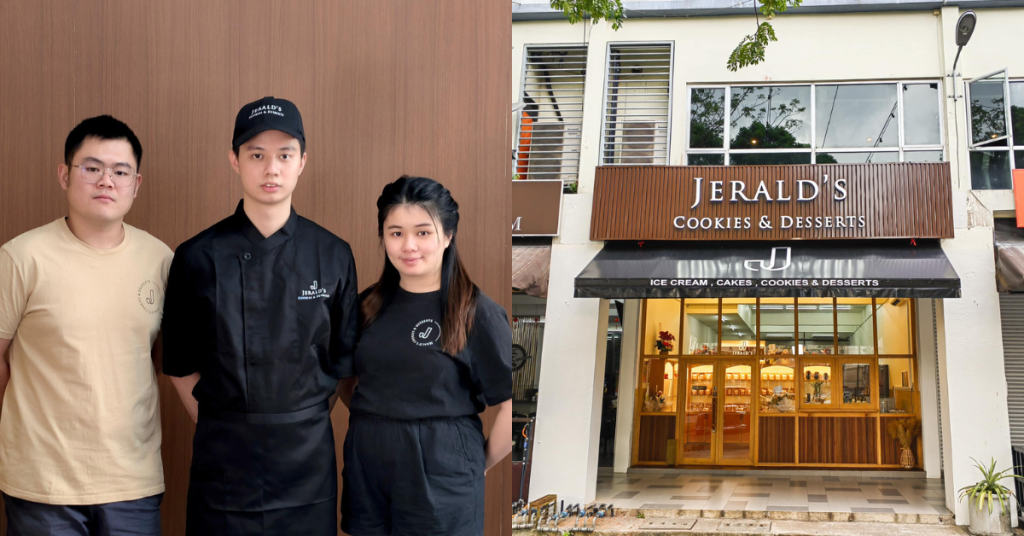
When Ke Sing first started her home-based cookies brand, she had no idea that it’d grow into something quite as big as Jerald’s Cookies & Desserts seven years later.
In a conversation with Vulcan Post, Marco, her husband, shared that Ke Sing has a background in graphic design but wanted to venture into entrepreneurship. At the same time, she loved eating cookies. So, why not merge her two interests together?
“Growing up, she always loved to eat Famous Amos cookies,” Marco noted. “But she noticed that in Malaysia, there wasn’t really a homegrown cookie brand that stood out.”
She started baking and selling one jar, then 10, and then slowly and surely, it became a full-fledged business, famed for its cookies and cakes.
Achieving unexpected virality
At this point, you might be wondering who Jerald is.
Jerald is actually Ke Sing’s brother, and beyond being the namesake of the brand, he also plays a huge role as the person who introduced the “desserts” part of Jerald’s Cookies & Desserts.
It turns out that Jerald is quite skilled at creating desserts such as cakes. He’s now in charge of creating the majority of the desserts sold by the business.
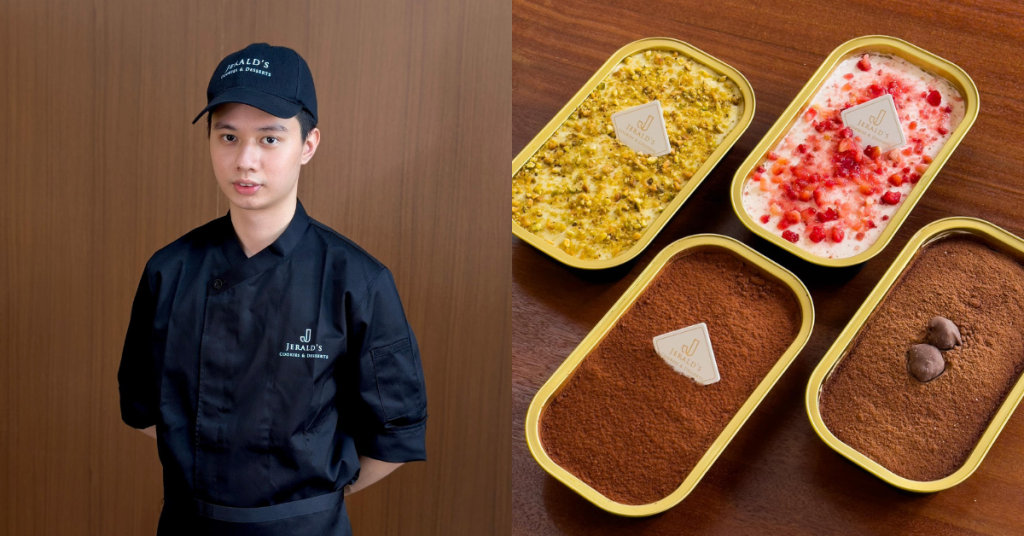
Jerald had joined the company quite early on, but Marco only joined his wife and brother-in-law after the MCOs.
“I saw the potential in the business,” he explained. “I myself have a background in sales and have expertise in advertising and marketing. So, I suggested, why don’t the three of us actually work together?”
But the breakthrough moment for the company came during the Kuching Festival Food Fair.
Marco shared that this annual event, which happens around July and August, draws in quite a large crowd from Peninsular Malaysia and other countries. Nowadays, it’s so competitive that vendors have to join a waiting list to vie for a spot.

In 2022, they decided to sell their classic tiramisu there, which ended up going viral. This really helped put them on the map and even landed them the Best Bake award at the festival.
But what’s so unique about their tiramisu? Home bakeries in Kuching are aplenty, Marco pointed out, and many of these brands would actually take up stalls at festivals, too.
“Maybe because the flavour profile was refined to fit locals’ palates,” Marco mused.
While the market is saturated with smaller players, there aren’t actually many standout competitors when it comes to large-scale productions—especially with cookies.

“People may think that we’re just a desserts brand with our ice cream and cakes, but actually, we’re more of a manufacturing business. Our biggest focus is still on our cookies. We just didn’t know that we’d get famous for our tiramisu,” he said.
Aside from delivering good bakes, Jerald’s Cookies & Desserts is also known for its beautiful packaging, designed by Ke Sing herself.

She also designs the beautiful, award-winning booths that Jerald’s Cookies & Desserts is stationed within during the Kuching Festival Food Fair.
Scaling through bottlenecks
With the rising popularity caused by the 2022 Kuching Festival Food Fair, the home bakery could no longer suffice.
“If we didn’t change our location, our capacity would be stuck there,” Marco said. “At that point, our production was in the 10,000 range for just the festival period, but we would get bottlenecked there due to space constraints.”
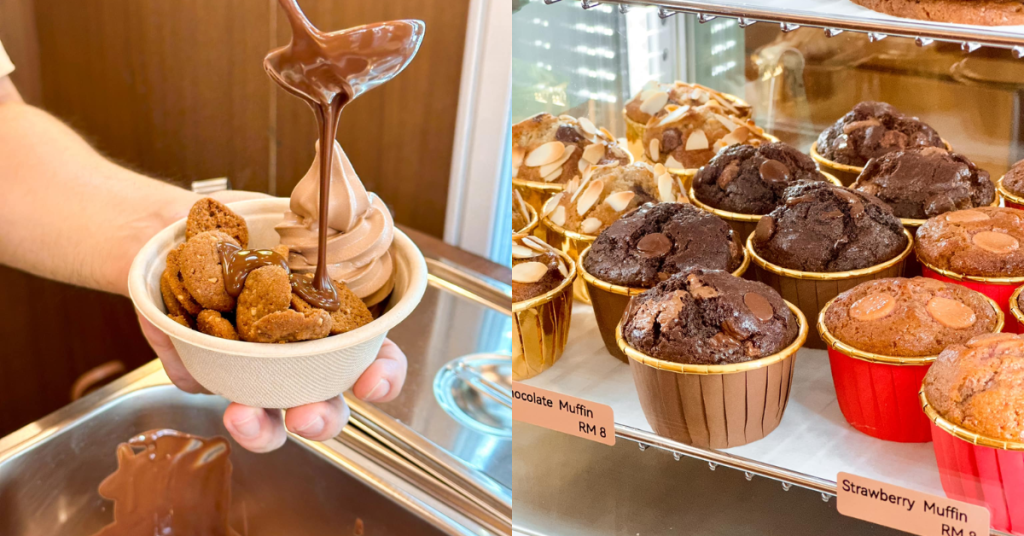
Thus, they decided to open up their first physical shop during the end of 2022, after their first year of virality at the Kuching Festival.
Currently, there’s only one physical outlet, but the team has acquired the lot next door to help with production.
As much as Kuching Festival helped the business boom, the more pressing matter for the team is festive seasons. Demand soars during periods like Christmas, Chinese New Year, and Gawai. Marco told Vulcan Post that they see 10,000 to 20,000 transactions during these seasons.

Marco added, “This year, I think our production may double again, so we will need to find a third space. But it might make more sense to actually look into a large-scale factory.”
Another bottleneck, though, is caused by the supply of ingredients—or lack thereof.
Kuching is a smaller market; thus, there is less stock being imported by suppliers. This is especially true with the high-quality ingredients that Jerald’s Cookies & Desserts seek. Their butter, for one, comes all the way from France.
Given this obstacle, the team has learnt to order their ingredients very early on in advance, so customers can enjoy their festive bakes without worries.
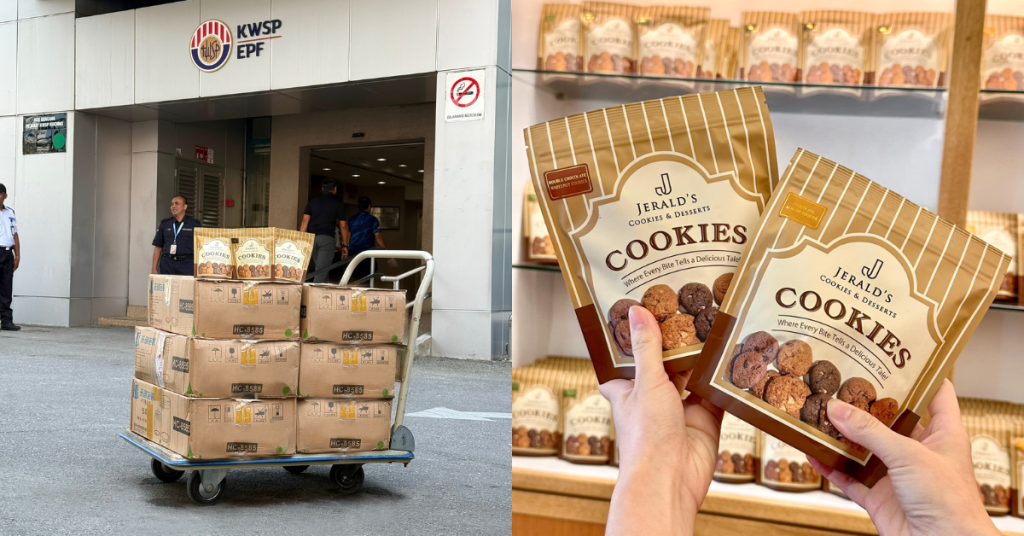
Slowly and steadily
Initially, the trio behind the business had zero experience with business. But step by step, as a response to the increasing attention demand, they’ve picked up the necessary know-how.
There’s still much to learn, of course, but one thing that motivates the management team is their staff.
“They’ve helped us a lot. The three of us aren’t able to achieve much. So, we’re really happy that we can find precious team members that have our best interest in mind,” Marco said. “Sometimes, we can get quite worried about things, but they end up being more worried than us and will help us solve issues together.”
The co-founder shared that the team does get properly rewarded with benefits and bonuses whenever the business achieves awards and accolades.
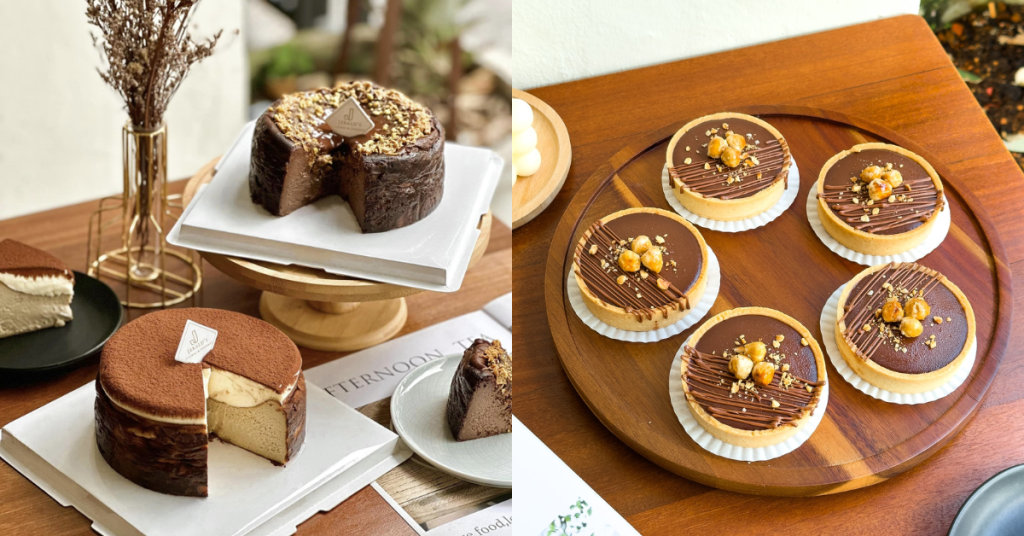
Thanks to this reliable team, the three co-founders can focus on growing the business. The secret ingredient to their growth, Marco believes, is simply listening to feedback.
This advice might seem overrated, but perhaps it’s overrated for a good reason. There can’t be a successful business without customers, after all.
As an example, the bakery aims to obtain a halal certification next year to better serve Muslim customers.
Another key component is their intensive research and development.
“We won’t spread ourselves too thin and release a huge variety of flavours. We typically focus on a few,” Marco said. “Our cookies have four flavours, our cakes have four flavours, and our ice cream has two flavours. Because we’re not seeking quantity, but quality.”
But that doesn’t mean that they don’t keep up with trends. In fact, Jerald’s Cookies & Desserts will release trendy flavours for a limited time. For one, they managed to tap into the recent craze with Dubai chocolate.
For those interested in checking out Jerald’s Cookies & Desserts at the next Kuching Festival Food Fair, you’d be happy to know that as an awardee, Jerald’s Cookies & Desserts already has a guaranteed spot at the festival in 2025.

For folks like us over in the Klang Valley, you might be hoping that they’ll expand here soon.
While they definitely have ambitions to open a shop in KL, the business is focusing on areas like Miri and Sabah first.
“And actually, my wife’s ambitions are even bigger than mine,” Marco shared. “She has hopes to bring Jerald’s Cookies & Desserts abroad.”
Given the trajectory of their growth thus far, I’d say that the sky is the limit for this Kuching desserts brand.
- Learn more about Jerald’s Cookies & Desserts here.
- Read other articles we’ve written about Malaysian startups here.
Also Read: Mega sales are coming up in M’sia, here’s how to ensure that your parcels don’t go missing
Featured Image Credit: Jerald’s Cookies & Desserts
These M’sian sisters started a beauty store with affordable int’l brands, now has 4 outlets
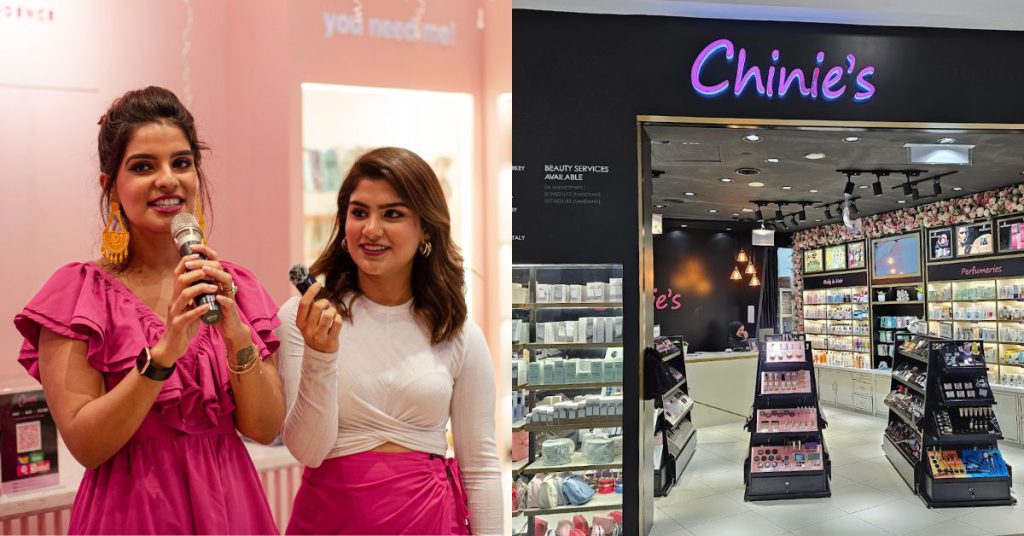
As a makeup lover, Sephora has always been a tempting destination for me, especially for its inclusive range and impressive variety. But let’s be honest, it comes with a hefty price tag.
Spending RM100 or more on a single product isn’t feasible for everyone. This challenge is something I’ve faced personally, and it’s also what inspired Kanchan Ratnani to take matters into her own hands.
When sisters Kanchan and Vandana Ratnani co-founded Chinie’s, they didn’t just launch a beauty business—they ignited a mission to bridge the gap between luxury and affordability in Malaysia’s beauty market.
For Kanchan, the idea of Chinie’s began with a spark of curiosity during her graduation trip to Europe. Wandering through stores like Kiko Milano and Flormar, she was struck by the affordability and quality these brands offered—something she found lacking back home.
Speaking to Vulcan Post, Kanchan shared “As a student, I could barely afford Sephora products, no matter how much I loved them.” Armed with her mother’s credit card, she stocked up on products to sell back in Malaysia.
“To my surprise, everything sold out within a month,” Kanchan recounted. “It wasn’t planned at all, but the success of that first sale made me realise there was a gap in the market—and we could fill it.”
Her sister Vandana joined the venture shortly after, bringing her business acumen and marketing expertise into the fold. They now partner with numerous international beauty brands to make their products accessible in Malaysia.

Together, they turned a casual experiment into a full-fledged beauty brand that now boasts both online and retail presence across Malaysia.
Blending local and international brands
At Chinie’s, inclusivity is a cornerstone of their brand philosophy. The store offers a curated selection of both international and local brands, catering to Malaysia’s diverse beauty needs.
“International brands bring innovation and trends, but local brands resonate with cultural nuances,” they explained.
Best-selling names like L.A. Girl and Mesauda Milano lead the international lineup, while local favourites like Alha Alfa cater to Malaysia’s humid climate with long-lasting, high-performing formulations.

Chinie’s also highlights skincare brands like SKIN1004, known for tackling common issues like acne and sensitivity in tropical weather.
This blend ensures that Chinie’s appeals to a wide demographic, offering quality across various price points. “We want every Malaysian, regardless of their skin tone or budget, to find something they love at Chinie’s,” they said.
Malaysia’s beauty market is undoubtedly competitive, dominated by global names like Sephora and drugstore giants. But Chinie’s has carved out a niche by offering what these big players often lack—a personalised, inclusive shopping experience.
“Sephora gave us quality but at a price that wasn’t always accessible. Drugstore cosmetics were affordable but often lacked shade ranges or durability in our climate,” they noted.
“Chinie’s sits in that sweet spot, offering quality without compromise.”
The brand’s commitment to inclusivity extends to its partnerships. Before onboarding any product, the sisters personally test everything to ensure it meets their high standards.
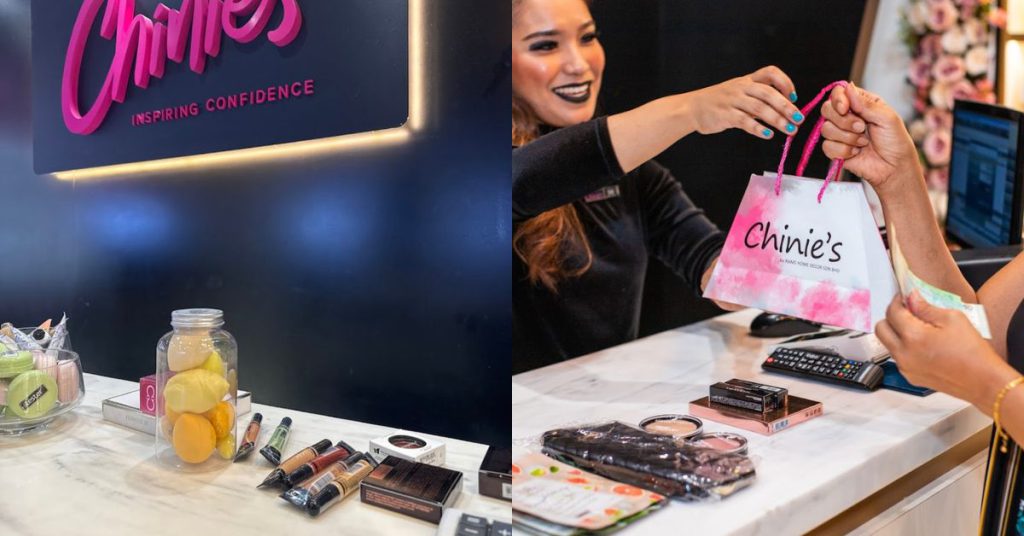
In one instance, Chinie’s discontinued a brand after it withdrew deeper skin tones from its foundation range. “It cost us financially, but we couldn’t compromise our values,” said the founders without disclosing the brand’s name.
Collaborations that count
Chinie’s has also gained traction through its collaborations with local makeup artists and influencers. These partnerships range from DIY makeup classes to live tutorials, showcasing the versatility and quality of Chinie’s products.
Some notable collaborations include sessions with international and local makeup artists like VithyaHairandMakeup, Siew Kim Chai, Aqielah Misran and Karmen Mahi Gill, whose workshops or classes have been instrumental in building trust within the beauty community.

Influencers like @ashyy_edward, @syamimifzain and @dashbeauty0607 further amplify the brand’s reach, sharing authentic reviews and tutorials with their audiences.
“Collaborating with these talented individuals has been a game-changer,” said Vandana. “They help us connect with our customers on a more personal level, turning followers into loyal fans.”
A retail journey of growth and recognition
Chinie’s first step into retail was with a modest 200-square-foot space within Rams Home Decor in Pekan Rabu, Langkawi in 2017. Over time, their expansion took them to bustling locations like NU Sentral in KL and IOI City Mall in Putrajaya. They also opened another outlet in Langkawi.

“Opening at IOI was a strategic move—it’s the largest mall in Malaysia and connects us to so many new customers, even from Singapore,” the sisters said.
“In 2019, we set a company goal to establish five outlets by 2025, and we’re excited to be just one outlet away from making that a reality.”
The sisters also recall a pivotal exhibition at KLCC, where demand exceeded their expectations.
“We had to fly in extra stock mid-event just to keep up,” the duo reminisced. Moments like these affirmed their belief in Chinie’s potential and fueled their drive to keep growing.

Not only that, you can also find them on e-commerce platforms such as Shopee, Lazada, and Zalora.
“These e-commerce channels also gave our customers a seamless way to explore and purchase our products, resulting in a marked increase in online sales.”
“It also helped us sail through the pandemic with all our retail spaces being shit for many months,” they added.
Staying true to their roots
Despite their rapid growth, Kanchan and Vandana remain deeply connected to their roots. Their upbringing in a business-oriented family instilled the work ethic and resilience that underpin Chinie’s success today.
“We watched our parents work tirelessly, even during holidays. That experience taught us the importance of dedication and adaptability,” Kanchan and Vandana said.
This mindset has guided them through challenges, from navigating supply chain disruptions to redefining their brand identity as they transitioned from department stores to standalone outlets.
The future looks bright for Chinie’s as the sisters continue to expand their retail footprint and strengthen their online presence. With a growing list of loyal customers and collaborations, the brand is well on its way to becoming a household name in Malaysia’s beauty scene.

“We dream of Chinie’s being a one-stop beauty haven for everyone, regardless of where they come from or what their budget is,” the duo shared. “We’re just getting started.”
As the Ratnani sisters continue their journey, they’re not only reshaping beauty accessibility but also redefining what it means to run a values-driven, inclusive brand in an ever-changing market.
- You can learn more about Chinie’s here.
- Read other articles we’ve written about Malaysian startups here.
Also Read: This Microsoft Copilot workshop convinced me that AI can help content creators, here’s how
Featured Image Credit: Chinie’s / Ilamaran Ramamoorthy